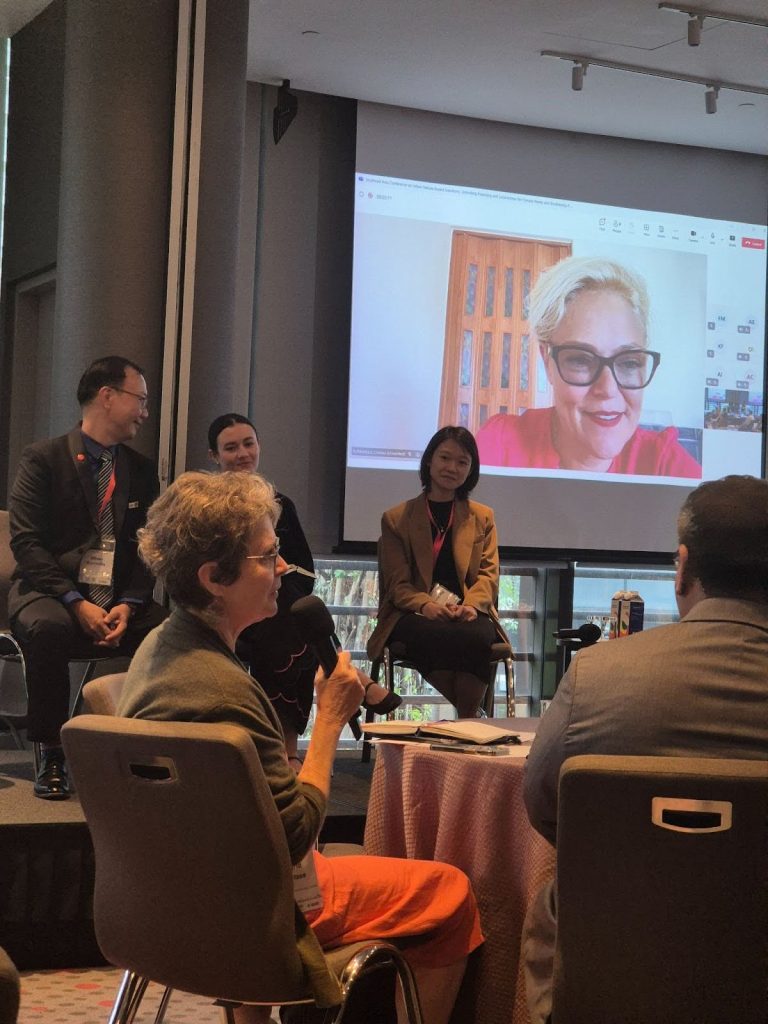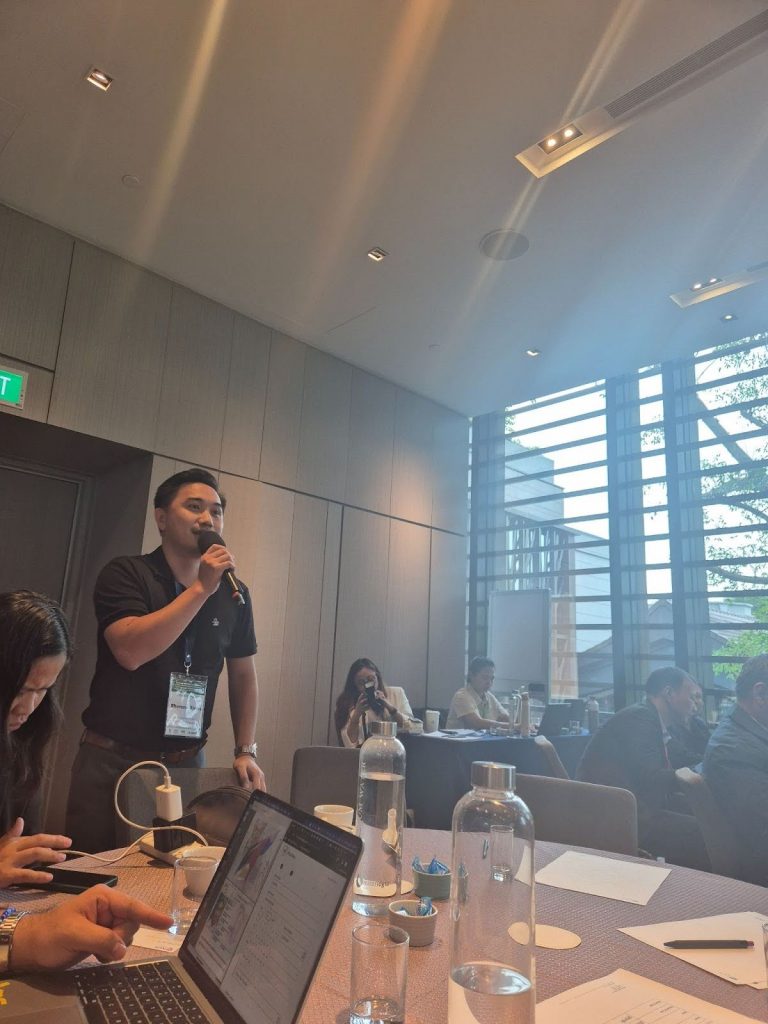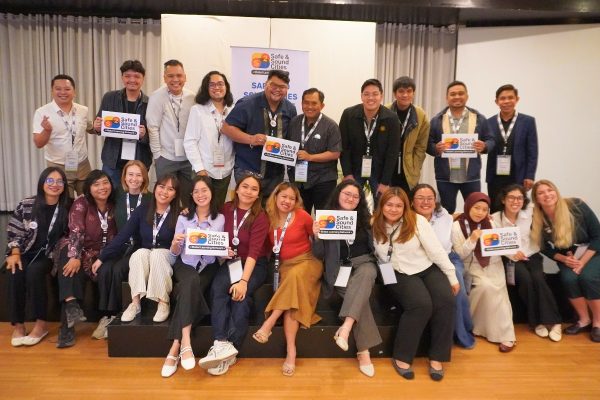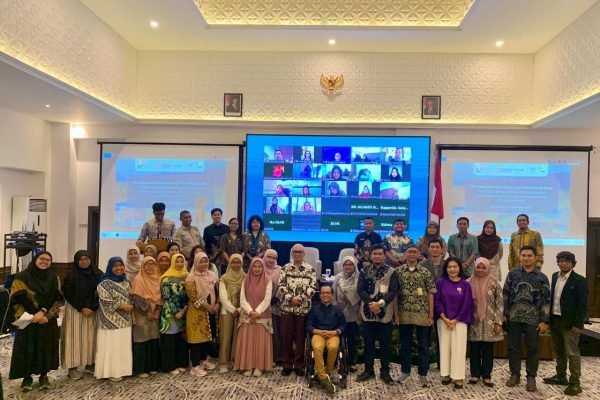On 19–20 August 2025 in Singapore, city leaders, national governments, finance experts, and regional bodies from five Southeast Asian countries gathered to ramp up climate and biodiversity action. At the two-day conference on urban nature-based solutions, they pledged stronger, faster efforts to harness nature as a powerful ally in tackling the climate and ecological crises.
Themed “Unlocking Financing and Local Action for Climate-Ready and Biodiversity-Positive Cities,” the event saw delegates from Indonesia, Malaysia, the Philippines, Singapore, and Thailand tackling how to translate the Global Biodiversity Framework into regional and local priorities through biodiversity’s intersections with finance, health, and locally-driven actions.
In their opening messages, key leaders set the tone for the conference by emphasizing collaboration, local leadership, and stronger financing for biodiversity.

Alfredo Coro, Mayor of the Municipality of Del Carmen, Philippines, and Chair of the ICLEI Biodiversity, Water, and One Health Portfolio delivers his speech online as one of the conference conveners.
Lim Liang Jim, Senior Director of International Biodiversity Conservation at the Singapore National Parks Board (NParks), stressed the importance of peer learning. Alfredo Coro, Mayor of the Municipality of Del Carmen in the Philippines and ICLEI Biodiversity, Water and One Health Portfolio Holder, underlined the crucial role of local governments in addressing biodiversity loss and climate change. Mirey Atallah, Director of Resilience and Adaptation of the United Nations Environment Programme (UNEP), framed nature as central to climate solutions; while Jerome Montemayor, Executive Director of the ASEAN Centre for Biodiversity (ACB), urged action to close the biodiversity finance gap.

Dr. Debra Roberts, Working Group II Co-Chair of the Intergovernmental Panel on Climate Change (IPCC), shares her work on climate impacts and biodiversity.
Dr. Debra Roberts, Working Group II Co-Chair of the Intergovernmental Panel on Climate Change (IPCC), delivered a sobering keynote on climate overshoot. She said the world is lagging behind Paris Agreement targets and warned that adaptation alone will not suffice. “We are not going towards extinction,” Roberts said, “but climate action should be accelerated to make living on Earth not any more challenging than it already is.”

Ingrid Coetzee, Director of the ICLEI Cities Biodiversity Center (right), and Siti Zulaika of the Ministry of Environment and Natural Resources of Malaysia (left), reflecting on the Biodiversity COP16 in Cali, Colombia and Rome, Italy.
A fireside chat between Ingrid Coetzee, Director of Biodiversity, Nature, and Health at ICLEI Cities Biodiversity Center, and Siti Zulaika of the Ministry of Environment and Natural Resources of Malaysia, reflected on the 2024 United Nations Biodiversity Conference (CBD COP16) in Cali, Colombia. Both praised the milestone agreement but pointed out gaps in financing and multi-stakeholder action. Zulaika highlighted the importance of indigenous and local knowledge working alongside science and technology, while Coetzee urged a focus on ambitious and accelerated action.
A series of keynote presentations and panel discussions explored the roles of cities in coastal community resilience, public health, economy, and financing.

Panel 1 members discussing coastal cities and biodiversity.
Moderated by Sharon Gil, Programme Manager at UNEP Cities Unit, the panel on coastal cities saw perspectives from Ashley James Brosnan, Counsellor on Climate at the Australian High Commission in Singapore; Aimee Gonzales, Executive Director of the Partnerships in Environmental Management for the Seas of East Asia (PEMSEA); and Rocky Sanchez Tirona, Managing Director of Fish Forever.

Neil Khor of Kuala Lumpur asking the panel how to inspire biodiversity action in the face of climate change
The panel stressed that integrated coastal management should link with broader local development plans; that communities must be capacitated to enable accelerated grassroots adaptation; and that scaling up finance, forging private partnerships, adopting new technologies, and giving cities a stronger voice in national and global arenas are key to realizing actions in this space.

Lim Liang Jim, Senior Director of International Biodiversity Conservation at the Singapore National Parks Board, shares Singapore’s experience in becoming a City in Nature.
Seated in by Lim Liang Jim; Sharlene Ng, Director of the Centre for Science of Urban Nature at Singapore NParks; Christina Romanelli, Biodiversity, Climate, and Health Focal Point at the World Health Organization; and Dr. Emma Ramsay, Research Fellow at the Asian School of the Environment of the Nanyang Technological University, the second panel session unpacked how urban biodiversity links to human health through the One Health framework.

Ingrid Coetzee, Director of the ICLEI Cities Biodiversity Center (left, foreground), provides input to Panel 2 discussing the linkages of biodiversity and health.
They stressed that protecting nature ultimately protects people, and that greener cities reduce heat risks, prevent disease, and deliver vital co-benefits in the field of public health. The panelists also urged more creative incentives to nature-based solutions, better science communication, and innovative tools like low-cost sensors to guide local decisions.

Atty. Sedfrey Lopez Cabaluna, a Councilor of Iloilo City, Philippines, presents Iloilo’s current initiatives for urban biodiversity and sustainability.
The third panel tied nature to economic resilience, warning that ignoring environmental costs could disrupt entire economic systems. Moderated by ICLEI CBC’s Ingrid Coetzee and featuring Perrine Hamel from the Asian School of the Environment of the Nanyang Technological University; Eric Hoa, Coordinator for Climate, Biodiversity, and Pollution of the United Nations; and Atty. Sedfrey Lopez Cabaluna, a Councilor of Iloilo City, Philippines; the panel urged integrating these environmental costs into business value chains and coupling growth with stronger protection of natural assets. The discussion emphasized the need to “make nature everyone’s business” as sustainable economies heavily depend on healthy ecosystems.

Mirey Atallah, Director of Resilience and Adaptation of the United Nations Environment Programme, gathers inputs from Panel 4 members on urban biodiversity finance.
Lastly, UNEP’s Mirey Atallah moderated the closing panel tackled the topic of urban biodiversity finance. Speakers composed of Kavitha Menon, Director of Singapore Sustainable Finance Association; Pallavi Kalita, Asia Lead of Business for Nature; Joseph D’Cruz, CEO of Roundtable on Sustainable Palm Oil and Director of Climate Governance Malaysia; Lee Wei Hsien, Senior Technical Officer for Finance and Economics for Nature of the IUCN Regional Office in Southeast Asia; Ma. Veronica Hitosis, Executive Director of the League of Cities of the Philippines; and Nosrat Ravichandran, Head of Nature, Climate, and Energy of BIOFIN Malaysia, flagged high upfront costs and mismatched funding mechanisms as major roadblocks for local governments. To bridge the gap, they called for new finance taxonomies, stronger middle-management capacity to develop bankable projects, and better use of existing platforms to fund more long-term nature initiatives.

Rhenan Diwas, Department Head of the Baguio City Environment and Parks Management Office from the Philippines, shares his key takeaways from the conference
The two-day event closed with concrete commitments from national governments, city leaders, and regional organizations such as UNEP, ICLEI, Singapore NParks, PEMSEA, and ACB. Delegates pledged to conduct baselining of urban biodiversity efforts, integrate biodiversity into local and national plans, and expand youth and community involvement.

Jerome Montemayor declares the ASEAN Centre for Biodiversity’s commitments and plans for the future.
Organizers saw the gathering as a “marching signal” that Southeast Asia is ready to lead in advancing Target 12 on Urban Biodiversity of the Global Biodiversity Framework.
Photos by James Anthony Oriña




